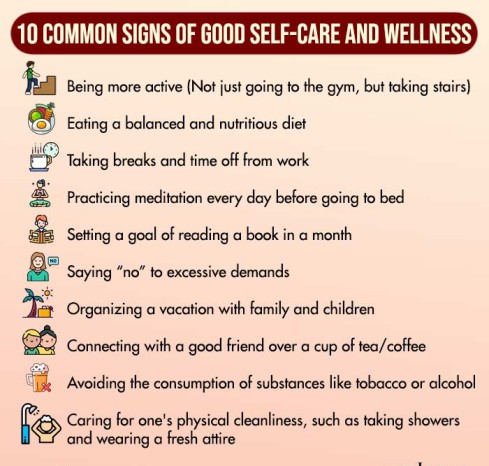Self care and wellness involve prioritizing physical, mental, and emotional health through intentional actions, leading to improved quality of life. Regular practice of self-care and wellness can also enhance resilience and prevent burnout in challenging situations.
What Is Self Care And Wellness?
Self-care refers to the deliberate and conscious practice of treating oneself as a priority 1 Martínez, N., Connelly, C. D., Pérez, A., & Calero, P. (2021). Self-care: A concept analysis. International journal of nursing sciences, 8(4), 418–425. https://doi.org/10.1016/j.ijnss.2021.08.007 and taking steps to enhance one’s overall health and well-being.
The 7 pillars of self-care include physical, emotional, social, intellectual, spiritual, environmental, and occupational self-care, all of which work together to promote optimal health and wellness.
On the other hand, wellness is a holistic concept 2 Stoewen D. L. (2017). Dimensions of wellness: Change your habits, change your life. The Canadian veterinary journal = La revue veterinaire canadienne, 58(8), 861–862. that recognizes an individual’s potential to lead a fulfilling life by actively seeking balance and health. This involves engaging in physical activity, healthy diet, managing stress, and seeking mental health support to find purpose and meaning in life.
Self care and wellness are integral concepts that play a crucial role in ensuring adequate mental health functioning. Contrary to popular belief, prioritizing one’s own needs through self care and wellness is not selfish 3 Mills, J., Wand, T., & Fraser, J. A. (2015). On self-compassion and self-care in nursing: selfish or essential for compassionate care?. International journal of nursing studies, 52(4), 791–793. https://doi.org/10.1016/j.ijnurstu.2014.10.009 ; in fact, it can enhance the ability to be present and supportive of others.

What Are The Barriers To Self-care
Some common obstacles or hurdles 4 Bayliss, E. A., Steiner, J. F., Fernald, D. H., Crane, L. A., & Main, D. S. (2003). Descriptions of barriers to self-care by persons with comorbid chronic diseases. Annals of family medicine, 1(1), 15–21. https://doi.org/10.1370/afm.4 that individuals may face in their pursuit of self care and wellbeing include:
- Lack of time 5 Lewis, S., Willis, K., Bismark, M., & Smallwood, N. (2022). A time for self-care? Frontline health workers’ strategies for managing mental health during the COVID-19 pandemic. SSM. Mental health, 2, 100053. https://doi.org/10.1016/j.ssmmh.2021.100053 due to work or family responsibilities
- Limited access to resources 6 Pokhrel, S., Shrestha, S., Timilsina, A., Sapkota, M., Bhatt, M. P., & Pardhe, B. D. (2019). Self-Care Adherence And Barriers To Good Glycaemic Control In Nepalese Type 2 Diabetes Mellitus Patients: A Hospital-Based Cross-Sectional Study. Journal of multidisciplinary healthcare, 12, 817–826. https://doi.org/10.2147/JMDH.S216842 or information about self-care practices
- Financial constraints can prevent access to wellness 7 Morris, J. L., & Chasens, E. R. (2017). Financial Difficulty: A Barrier to Self-care in Patients With Diabetes. The Diabetes educator, 43(3), 247–248. https://doi.org/10.1177/0145721717703486 activities or services
- Negative self-talk 8 Kim, J., Kwon, J. H., Kim, J., Kim, E. J., Kim, H. E., Kyeong, S., & Kim, J. J. (2021). The effects of positive or negative self-talk on the alteration of brain functional connectivity by performing cognitive tasks. Scientific reports, 11(1), 14873. https://doi.org/10.1038/s41598-021-94328-9 or self-doubt that makes it hard to prioritize self care and wellness
- Cultural or societal norms 9 Osokpo, O., & Riegel, B. (2021). Cultural factors influencing self-care by persons with cardiovascular disease: An integrative review. International journal of nursing studies, 116, 103383. https://doi.org/10.1016/j.ijnurstu.2019.06.014 that discourage self-care or prioritize productivity over the well-being
- Difficulty sticking to a routine 10 Arlinghaus, K. R., & Johnston, C. A. (2018). The Importance of Creating Habits and Routine. American journal of lifestyle medicine, 13(2), 142–144. https://doi.org/10.1177/1559827618818044 or incorporating new habits into one’s lifestyle
Types Of Self-care
Here are several effective types of self-care that can help promote overall wellness:
1. Physical Self-care
Physical self-care is important because it involves getting enough sleep 11 Goudarzian, A. H., Bagheri Nesami, M., Zamani, F., Nasiri, A., & Beik, S. (2017). Relationship between Depression and Self-care in Iranian Patients with Cancer. Asian Pacific journal of cancer prevention : APJCP, 18(1), 101–106. https://doi.org/10.22034/APJCP.2017.18.1.101 , exercising regularly, eating a healthy and balanced diet, staying hydrated, taking breaks from sitting or screen time, and getting regular medical check-ups.
2. Emotional Self-care
Emotional self-care comes in the forms of practicing mindfulness 12 Garcia, A. C. M., Ferreira, A. C. G., Silva, L. S. R., da Conceição, V. M., Nogueira, D. A., & Mills, J. (2022). Mindful Self-Care, Self-Compassion, and Resilience Among Palliative Care Providers During the COVID-19 Pandemic. Journal of pain and symptom management, 64(1), 49–57. https://doi.org/10.1016/j.jpainsymman.2022.03.003 or meditation, engaging in creative hobbies, journaling, seeking therapy or counseling, practicing self-compassion and positive self-talk, and setting boundaries.
3. Social Self-care
This involves building and maintaining supportive relationships 13 Okpalauwaekwe, U., Li, C. Y., & Tzeng, H. M. (2022). Social Determinants and Self-Care for Making Good Treatment Decisions and Treatment Participation in Older Adults: A Cross-Sectional Survey Study. Nursing reports (Pavia, Italy), 12(1), 198–209. https://doi.org/10.3390/nursrep12010020 , spending time with loved ones, participating in group activities, joining social or community groups, and seeking social support.
4. Spiritual Self-care
It involves engaging in religious or spiritual practices 14 Green C. (2021). Spiritual Health First Aid for Self-Care: Nursing During COVID-19. Journal of Christian nursing : a quarterly publication of Nurses Christian Fellowship, 38(3), E28–E31. https://doi.org/10.1097/CNJ.0000000000000851 , spending time in nature, practicing gratitude, engaging in acts of service or volunteering, and reflecting on one’s purpose or values.
Importance Of Self-Care And Wellness
There are several reasons why self-care is crucial for maintaining adequate wellness, such as:
1. Improves Mood
Engaging in self-care activities can improve mood 15 Brazeal, M., Blackmon, B. J., & Zakaras, L. (2022). The Role of Mood in the Self-Care Activities of Primary Care Patients with Type 2 Diabetes. Social work in public health, 37(5), 397–406. https://doi.org/10.1080/19371918.2021.2017380 and increase feelings of happiness, positivity, and well-being.
2. Self-care in Mental Health Recovery
By engaging in self-care activities individuals can learn to recognize the triggering situations that can relapse the symptoms related to their mental health 16 Hanrahan, N. P., Rolin-Kenny, D., Roman, J., Kumar, A., Aiken, L., & Blank, M. (2011). Promoting Self-Care Management among Persons with Serious Mental Illness and HIV. Home health care management & practice, 23(6), 421–427. https://doi.org/10.1177/1084822311405457 issues.
3. Increases Resilience
Self-care practices help individuals build resilience 17 Dave, U., & Taylor-Robinson, S. D. (2022). Maintaining Resilience in Today’s Medical Environment: Personal Perspectives on Self-Care. International journal of general medicine, 15, 2475–2478. https://doi.org/10.2147/IJGM.S354928 , which allows them to bounce back more easily from challenges or setbacks.
4. Promotes Physical Health
Self-care practices like eating well, getting enough sleep, and exercising regularly promote physical health 18 Ross, A., Yang, L., Wehrlen, L., Perez, A., Farmer, N., & Bevans, M. (2019). Nurses and health-promoting self-care: Do we practice what we preach?. Journal of nursing management, 27(3), 599–608. https://doi.org/10.1111/jonm.12718 and reduce the risk of chronic illness and disease.
5. Enhances Self-awareness
Practicing self-care allows individuals 19 Sutton A. (2016). Measuring the Effects of Self-Awareness: Construction of the Self-Awareness Outcomes Questionnaire. Europe’s journal of psychology, 12(4), 645–658. https://doi.org/10.5964/ejop.v12i4.1178 to tune into their needs, emotions, and experiences, which can help them better understand and manage their mental health.
6. Increases Productivity
When individuals prioritize self-care, they may find that they are more productive 20 Hammell K. W. (2009). Self-care, productivity, and leisure, or dimensions of occupational experience? Rethinking occupational “categories”. Canadian journal of occupational therapy. Revue canadienne d’ergotherapie, 76(2), 107–114. https://doi.org/10.1177/000841740907600208 and able to perform better in their personal and professional lives.
Effects Of Poor Self-care On Wellness
Lack of self-care can negatively affect wellness and may contribute to different mental health conditions 21 National Institute of Mental Health. (2021). Caring for Your Mental Health. Www.nimh.nih.gov. Available from: https://www.nimh.nih.gov/health/topics/caring-for-your-mental-health , including:
1. Increased Stress
Neglecting self-care can result in chronic stress 22 Luis, E., Bermejo-Martins, E., Martinez, M., Sarrionandia, A., Cortes, C., Oliveros, E. Y., Garces, M. S., Oron, J. V., & Fernández-Berrocal, P. (2021). Relationship between self-care activities, stress and well-being during COVID-19 lockdown: a cross-cultural mediation model. BMJ open, 11(12), e048469. https://doi.org/10.1136/bmjopen-2020-048469 , ultimately leading to negative impacts on both physical and mental health.
Read More About Stress Here
2. Anxiety and Depression
When an individual does not prioritize their wellbeing and self care needs, it can lead to the development of anxiety and depression 23 Pilkington, K., & Wieland, L. S. (2020). Self-care for anxiety and depression: a comparison of evidence from Cochrane reviews and practice to inform decision-making and priority-setting. BMC complementary medicine and therapies, 20(1), 247. https://doi.org/10.1186/s12906-020-03038-8 , which may cause a negative impact on their mood and ability to function effectively in daily life.
Read More About Anxiety Here
Read More About Depression Here
3. Insomnia
Poor sleep hygiene such as using electronic devices before bed, consuming caffeine before bedtime, and lack of self-care can lead to insomnia, which can increase the likelihood 24 Riegel, B., & Weaver, T. E. (2009). Poor sleep and impaired self-care: towards a comprehensive model linking sleep, cognition, and heart failure outcomes. European journal of cardiovascular nursing, 8(5), 337–344. https://doi.org/10.1016/j.ejcnurse.2009.06.003 of existing mental health conditions and impact overall wellness.
Read More About Insomnia Here
4. Low Self-esteem
When individuals do not practice self-care, they may struggle 25 Bagheri-Nesami, M., Goudarzian, A. H., Mirani, H., Jouybari, S. S., & Nasiri, D. (2016). ASSOCIATION BETWEEN SELF-CARE BEHAVIORS AND SELF-ESTEEM OF RURAL ELDERLIES; NECESSITY OF HEALTH PROMOTION. Materia socio-medica, 28(1), 41–45. https://doi.org/10.5455/msm.2016.28.41-45 with negative thoughts and emotions, such as low self-worth and negative self-talk, which can lead to reduced self-esteem or a lack of confidence in oneself.
Read More About Self-esteem Here
5. Substance Abuse
If individuals do not have healthy coping mechanisms or self-care practices, they may start using substances 26 Coordinating Care for Better Mental, Substance-Use, and General Health. Nih.gov; National Academies Press (US). Available from: https://www.ncbi.nlm.nih.gov/books/NBK19833/ such as drugs or alcohol as a means to cope with stress or negative emotions, which can lead to substance abuse and other forms of addiction.
Tips To Boost Self Care And Wellness
There are several ways to prioritize self-care and wellness, such as:
- Set aside a specific time in your schedule 27 Stilos, K. K., & Wynnychuk, L. (2021). Self-care is a MUST for health care providers caring for the dying. Canadian oncology nursing journal = Revue canadienne de nursing oncologique, 31(2), 239–241. for self-care activities, and treat this time as non-negotiable.
- Make a list of self-care activities that you enjoy such as exercise, meditation, or reading 28 Robertson, R., Wray, S. J., Maxwell, M., & Pratt, R. J. (2008). The introduction of a healthy reading scheme for people with mental health problems: usage and experiences of health professionals and library staff. Mental health in family medicine, 5(4), 219–228. , and incorporate them into your routine.
- Be kind and compassionate 29 Austin, J., Drossaert, C. H. C., Sanderman, R., Schroevers, M. J., & Bohlmeijer, E. T. (2021). Experiences of Self-Criticism and Self-Compassion in People Diagnosed With Cancer: A Multimethod Qualitative Study. Frontiers in psychology, 12, 737725. https://doi.org/10.3389/fpsyg.2021.737725 to yourself, and avoid negative self-talk or self-criticism.
- Learn to say no to commitments 30 Kristoffersen M. (2019). Problematizing Boundaries of Care Responsibility in Caring Relationships. SAGE open nursing, 5, 2377960818808692. https://doi.org/10.1177/2377960818808692 that don’t align with your needs and values, and prioritize your own well-being.
- Build and maintain supportive relationships, and seek social support 31 Dineen-Griffin, S., Garcia-Cardenas, V., Williams, K., & Benrimoj, S. I. (2019). Helping patients help themselves: A systematic review of self-management support strategies in primary health care practice. PloS one, 14(8), e0220116. https://doi.org/10.1371/journal.pone.0220116 when needed.
- Engage in mindfulness practices 32 Dysart, A., & Harden, S. M. (2022). Mindfulness and Understanding of Self-Care for Leaders of Extension: Promoting Well-Being for Health Educators and Their Clients. Frontiers in public health, 10, 862366. https://doi.org/10.3389/fpubh.2022.862366 like meditation or deep breathing exercises to help manage stress and promote relaxation.
- Reach out to a mental health professional 33 Posluns, K., & Gall, T. L. (2020). Dear Mental Health Practitioners, Take Care of Yourselves: a Literature Review on Self-Care. International journal for the advancement of counseling, 42(1), 1–20. https://doi.org/10.1007/s10447-019-09382-w for guidance and support in developing an adequate self-care plan, and for help in managing mental health conditions.
- Incorporate physical activity into your routine, whether it’s through exercise 34 Sharma, A., Madaan, V., & Petty, F. D. (2006). Exercise for mental health. Primary care companion to the Journal of clinical psychiatry, 8(2), 106. https://doi.org/10.4088/pcc.v08n0208a , outdoor activities, or simply taking regular breaks from sitting.
- Aim to get enough sleep each night 35 Sandberg, J. C., Suerken, C. K., Quandt, S. A., Altizer, K. P., Bell, R. A., Lang, W., Nguyen, H. T., Grzywacz, J. G., & Arcury, T. A. (2014). Self-reported sleep difficulties and self-care strategies among rural older adults. Journal of evidence-based complementary & alternative medicine, 19(1), 36–42. https://doi.org/10.1177/2156587213510005 , and practice good sleep hygiene habits like avoiding mobile use and listening to soothing music before bed.
Takeaway
The importance of self-care and wellness lies in its ability to promote physical and mental health, reduce stress, and improve overall well-being. Prioritizing self-care and well-being can be achieved through various approaches, such as developing healthy habits, setting boundaries, seeking support, and engaging in activities that promote relaxation and joy. It is important to remember that self-care is not selfish, but rather a necessary aspect of maintaining a healthy and fulfilling life.
At A Glance
- Self care and wellness are interrelated concepts.
- Well-being and self-care are crucial in reducing stress and enhancing physical and mental health.
- Barriers to self-care can include a lack of time, support, or motivation, as well as cultural or societal stigmas.
- There are several types of self-care, including physical, emotional, social, and spiritual.
- Self-care in mental health recovery involves deliberate actions that can help manage symptoms of depression and anxiety.
- Some tips for practicing self-care include getting enough sleep, engaging in regular exercise, maintaining a healthy diet, etc.
Frequently Asked Questions (FAQs)
1. Is self care and wellness the same?
Self care and wellness are related but not the same concepts. Self-care refers to the intentional actions individuals take to care for their physical, emotional, and mental health, while wellness encompasses a broader concept of overall health and well-being, including emotional, social, and spiritual health.
2. How do I start taking care of myself?
One can start taking care of himself/herself by making a priority for a self-care plan and focusing on things like sleep, healthy eating, and exercise.














